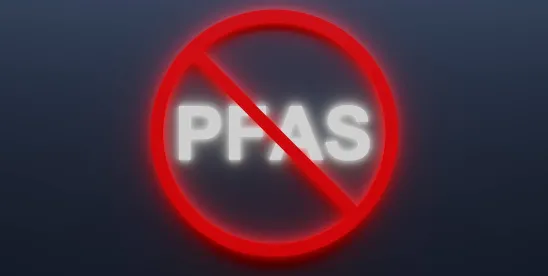As reported in our April 1, 2025, blog item, the Maine Board of Environmental Protection (MBEP) was scheduled to consider the Maine Department of Environmental Protection’s (MDEP) December 2024 proposed rule regarding products containing per- and polyfluoroalkyl substances (PFAS) during its April 7, 2025, meeting. As reported in our December 31, 2024, memorandum, on December 20, 2024, MDEP published a proposed rule that would establish criteria for currently unavoidable uses (CUU) of intentionally added PFAS in products and implement sales prohibitions and notification requirements for products containing intentionally added PFAS but determined to be a CUU. During the April 7, 2025, meeting, MBEP unanimously approved a motion to adopt the Chapter 90 rule, the Chapter 90 basis statement, and MDEP’s response to comments “as presented and with correction of minor typographical errors, and the addition of ‘Maine Department of Transportation’ at section 4(A)(8),” according to MBEP’s draft meeting minutes. Two MBEP members were absent.
Under the approved rule, CUU requests for products scheduled to be prohibited January 1, 2026, are due June 1, 2025. The products containing intentionally added PFAS that are scheduled to be prohibited include:
- Cleaning products;
- Cookware;
- Cosmetics;
- Dental floss;
- Juvenile products;
- Menstruation products;
- Textile articles. The prohibition does not include:
- Outdoor apparel for severe wet conditions; or
- A textile article that is included in or a component part of a watercraft, aircraft or motor vehicle, including an off-highway vehicle;
- Outdoor apparel for severe wet conditions; or
- Ski wax; or
- Upholstered furniture.
The January 1, 2026, prohibition applies to any of the products listed that do not contain intentionally added PFAS but that are sold, offered for sale, or distributed for sale in a fluorinated container or container that otherwise contains intentionally added PFAS.
Proposals for CUU determinations may be submitted by manufacturers individually or collectively. Under the rule, a separate proposal must be submitted for each individual combination of product category and the associated industrial sector. Proposals must include details of any sales prohibition to which the product is subject because of the intentionally added PFAS. As of January 1, 2025, Minnesota prohibited intentionally added PFAS in an almost identical list of products, with the exception of textile articles (Minnesota has banned textile furnishings containing intentionally added PFAS). A CUU proposal in Maine is still possible, but submitters will need to explain how products available in compliance with Minnesota’s prohibition are not reasonably available alternatives in Maine.




 />i
/>i

